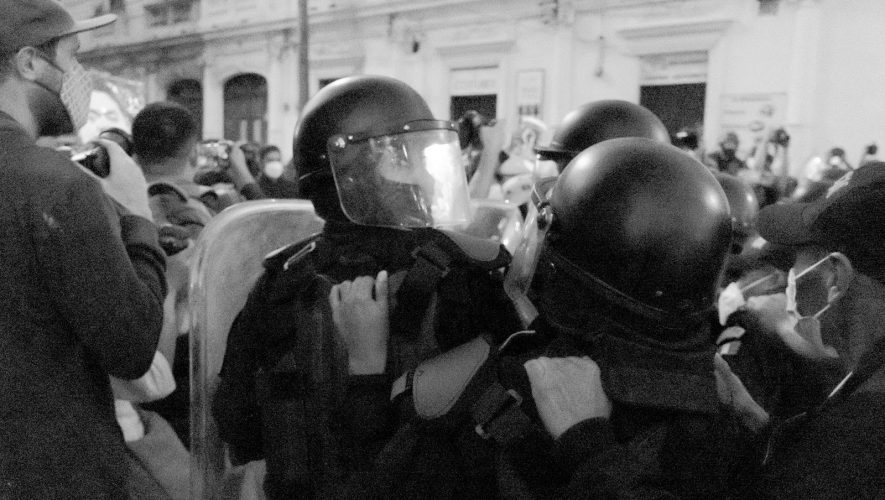I have never asked my neighbor for a cup of sugar, nor have I ever invited them over for dinner or done anything more than return their mail when it gets delivered to the wrong address. I wouldn’t attribute this to poor character, since a majority of Americans only know some of their neighbors and tend to limit interactions to necessary matters.
Instead, I worry about how poor community relationships impact American democracy—a regime responsible for maintaining order through means established by its citizens. America’s government cannot sustain its law or legitimacy when the public fails to participate in civic matters. Thus, the gradual deterioration of America’s modern civil society results in the decline of American democracy.
Civil society is “a community of citizens linked by common interests and collective activity.” This simplistic definition goes beyond neighborhoods to include clubs, churches, schools, unions, etc., where relationships develop free of government interference. Relationships formed in these environments can cultivate varied perspectives among participants, foster trust, and encourage diversity.
By establishing strong communal relationships, civil society promotes democracy. Making Democracy Work: Civic Traditions in Modern Italy explores this causal relationship in Northern and Southern Italy. Northern Italy had a stronger democratic regional government than the South because Northern citizens fortified relations among themselves through involvement in local organizations. The writers conclude that democratic governments form and stabilize in states where civil society blossoms.
American sociologist Theda Skocpol adds that civil society gives citizens the tools to participate in American governance, ultimately reinforcing federal democracy. Increased voter turnout manifests greater civic engagement as people identify the importance of elections and how their votes influence election results.
Unfortunately, the reference to political affairs may only conjure thoughts of polarization, misinformation, and voter fraud. This association is not because of a single controversial election, but rather decades of declining trends in democracy.
American democracy began its descent in the early 1960s, a period of social, economic, and political unrest stemming from the Civil Rights Movement, political assassinations, and the Vietnam War. Citizens were frustrated with the ineffectiveness of baring their teeth at the government, so they resorted to nipping one another’s heels by aggressively supporting either progressive policies or the status quo. In the years that followed, scandals, questionable wars, and political groupthink galvanized distrust toward the government.
Since the sixties, democracy’s deterioration occurred in tandem with a shocking increase in populist parties. As Western citizens become more discontent with their slow-moving governments, they are more likely to seek an authoritarian leader capable of resolving such ineffectiveness. American citizens demonstrated this desire when they elected President Trump, who promised to enact change. Trump played on the cultural fears and nationalist sentiment that lies beneath the surface of America’s democracy to impose a populist ideology, “Make America Great Again.”
When Generation Xers—an individualistic generation caught between the baby boomers and the millennials—became responsible for maintaining the momentum of civil society into the seventies and eighties, they failed. Following the strife and rapid reform of the sixties, citizens of the eighties were eager to help only themselves, especially following the recession in the seventies. This shift in societal values permeated every aspect of living, from politics to popular culture.
Suddenly, becoming friends with one’s neighbor seemed just as pointless as it does today. The deterioration of civil society correlated methodically with decreasing voter turnout from 1960 to 2000. In the eighties, President Reagan—exacerbating the American electorate’s sentiments—worked diligently to strengthen the Republican Party by limiting voter engagement. Once again, citizens failed to hold the government accountable, and the government failed to prioritize all of its citizens.
Upon becoming a burgeoning foundation for the Republican Party in the eighties, the Christian church publicly voiced its conservative opinions. Political association drove away many Christians from the church and established a reliance on alternative methods of maintaining spiritual balance. With each generation, more Americans have abandoned Christianity in favor of no religious belief. As of 2019, over a quarter of Americans are either atheist, agnostic, or have no religious affiliation—a trend that is likely to continue.
New technologies have only invigorated the progression toward individualism. Although technologies provide an open doorway for those diversifying their perspective, online communities often fail to create a more inclusive society. Internet users face Sidgwick’s “thousand petty fortresses” dilemma: exposure to such a wide array of ideas causes people to cluster within their zones of comfort, failing to expand their perspective and sometimes risking greater polarization.
Centralized echo chambers create the perception that many citizens support specific ideologies, despite the actual level of support being much less fortified. Key influencers can leverage media clout to lead centralized echo chambers and perpetuate their values, leading large social movements based on a few individuals’ beliefs. This phenomenon demonstrates how biased online networks corrupt communication between citizens and governmental entities. When the government overlooks the public’s true concerns and instead acts upon the media narrative, it diminishes its relationship with its people.
Those raised in the age of technology generally become less involved in public expression and feel as though their contributions are insignificant, destabilizing the fundamentals of democracy. Citizens in wealthy, centralized democracies value democracy less than prior generations. The ever-increasing inability of governmental systems to pass legislation has only exacerbated this disillusionment.
The onset of COVID-19 has done little to ameliorate struggling community connections and governmental efficiency. Long-term isolation has negatively impacted a majority of American adults who face an increased likelihood of anxiety or depression. Heightened mental health concerns have made it difficult to maintain healthy relationships, hindering everyone’s sense of connection to one another.
The decrease in individual well-being accompanied the revealing of structural fractures in America’s governance system, including racial injustice, economic disparity, and political dichotomization. The government’s disregard for its citizens’ needs are made apparent in its inadequate response to the aforementioned inequalities. Trump’s preference for law and order above justice and equity contributed to his view of Black Lives Matter as a “symbol of hate.” Regarding economic disparity, Congress had evidently stalled in discussions surrounding stimulus checks to aid citizens experiencing economic hardship. Political polarization is critical to sustaining America’s two-party governmental system.
The response to these sad truths from the public is chilling: riots and looting, hate crimes, and mutinous acts. Democracy is on the decline. This is not just an overly pessimistic view of modern political scientists; it reflects the division among American citizens and their inability to salvage what remains of our civil society.
To reinvigorate American democracy, we must address the structural issues of civil societies. All citizens must have access and feel confident enough to engage in governmental affairs.
To ensure that citizens are equipped to participate within a democratic governance system, they must view one another with equal respect so as to allow for equal opportunity. A more engaging civic education is vital toward creating this new social balance. Civic education must go beyond community meetings, voter drives, and national candidates. Citizens should receive an education specific to their experiences that properly evaluates how their involvement impacts not only themselves, but the community around them.
READ: How to Improve Political Maturity in America
Institutionalized educational experiences like improved voter education can create a more engaging civic experience. For instance, any voter should, among other things, understand how proposed economic policies would impact them, what is feasible in a candidate’s platform, the history of suffrage for their respective identity group, and how their vote contributes to our nation’s future.
These educational topics only address a few aspects that every educated voter should know. They may seem simplistic, but they are crucial to America’s social contract. And considering half of Americans do note vote, it’s clear our democracy fails to encourage true civic participation.
Considering how generalized civic programs with a focus on issue advocacy have increased voter engagement, it’s likely personalized programs will also find success. Moreover, when each citizen understands the significance of their civic contributions, they are more likely to be proud of their community and respect their fellow citizens; this phenomenon fosters a well-functioning governance system that encourages idea sharing and positive advocacy work.
Another critical step toward equal respect is to provide equal opportunity for citizens to engage in democracy and demonstrate an understanding of their knowledge. The institutionalization of vertical civil societies would be the most adept way of doing so. A vertical society permits “coordination of policy monitoring and public interest advocacy efforts across different ‘levels’ of the policy process, from the local to the national and transnational arenas.”
In establishing a vertical civil society, local community groups and grassroots organizations build upon their efforts to reach a goal that they believe would benefit many. If their designed goal does not further a noble cause or properly respect all citizens, then it’s unlikely they will succeed in bottom-up networking.
Considering other threats to creating a more politically equitable social contract, vertical civil societies will also ensure that the state practices forbearance. In this manner, social justice can be sustained by the people, with the collective good of citizens in mind.
Although difficult to implement, given the need for successful bottom-up networking, vertical integration permits long-term institutional changes that begin in communities. Thus, when community relationships and democracy have only been going down, a vertical civil society just might provide the much-needed lift upward.



